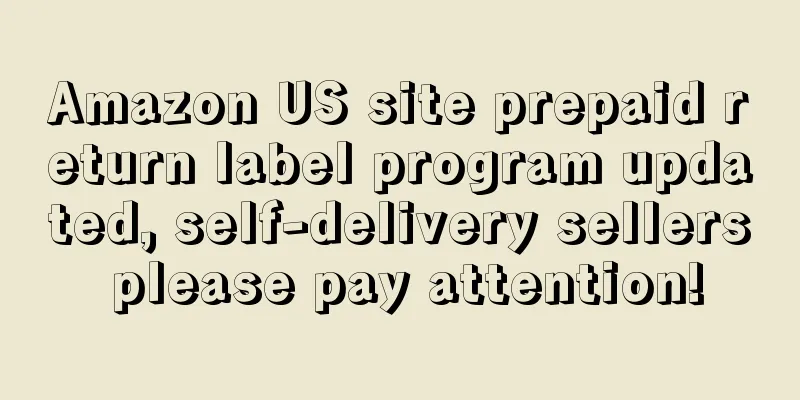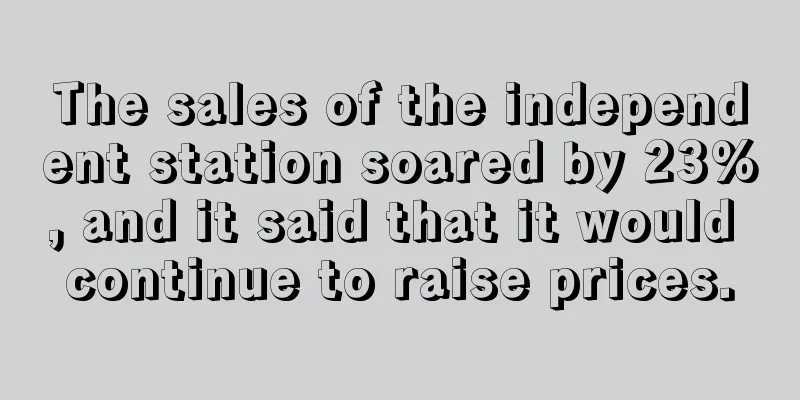Amazon introduces new policy for self-shipping sellers

|
Today, Amazon issued an announcement stating that it will change the prepaid return label exemption process for seller-fulfilled (FBM) products.
Starting September 2, 2021, if you sell on the US site, returns for the following product categories will automatically be exempt from prepaid returns and an authorization notice will be sent to the seller:
1.Hand -made customized products 2. Amazon Customized Products 3. Sexual health products 4. Certified pre-owned watches 5. Commercial, Industrial and Scientific Supplies > Professional Medical Supplies 6. Commercial, Industrial and Scientific Supplies > Professional Dental Supplies 7. Non-physical items (e.g. warranties, digital software or digital coupons) 8. Items that cannot be returned according to law and dangerous goods 9. Large and bulky products
Amazon emphasized that through this update to the self-delivery policy, the application exemption process for prepaid return labels has been simplified, and sellers will no longer be able to apply for exemptions for the following reason codes:
1. Products that do not meet USPS or UPS shipping standards (such as dangerous goods) 2. Shipping bulky items that weigh more than 70 pounds or have a combined length and girth of more than 108 inches
In addition, for some high-value items that require special transportation (goods valued at more than $100, requiring special transportation insurance), sellers can still apply for exemptions.
Amazon issued a new announcement with the aim of standardizing the return process for sellers who ship their own goods and reducing their workload. However, judging by sellers’ feedback on the new policy, the results were not ideal.
Seller A: Just a reminder that Amazon is surprisingly consistent in their definition of the word “simplify.” Does anyone really believe this change is intended to simplify things for sellers?
Seller B: If Amazon really wanted to “simplify” this policy for sellers, they would add products priced above $100 as a 10th to their current list of 9 tax-exempt categories and stop requiring millions of sellers to upload exemption requests for any product.
Seller C: This seems to favor direct sellers who mark up the prices of their products. They buy at wholesale or cost from sellers who have to accept a prepaid return process.
Sellers are dissatisfied with the new policy because they believe that Amazon does not understand the actual market situation and the difficulties sellers encounter in selling goods, but only favors consumers and even exploits sellers to give back to consumers. As an e-commerce platform company, Amazon is understandable to consider consumers, but it should also respect the rights of sellers. After all, sellers are one of the cornerstones of e-commerce. Amazon Seller Self-delivery |
>>: Amazon workers had to work in floodwaters after Hurricane Idai...
Recommend
The potential of "he economy" is released! Sellers who layout this segment track win
Relevant data show that in the past five years, g...
After winning the lawsuit against Amazon, the funds of many sellers were unblocked!
In 2021, Amazon took drastic measures to rectify ...
What is Sinoclick? Sinoclick Review, Features
SinoClick (DUCHIC TRADING LLC) is affiliated to Fe...
A brief analysis of the business strategy of Shein, a leading independent website
Shein, a Chinese fast fashion independent website...
What is FeedbackTuner
Feedback Tuner provides Amazon sellers with a pla...
What is BORAAKSU? BORAAKSU Review, Features
BORAAKSU is a fashion brand of the same name foun...
What is Fengniao Cross-border E-commerce? Fengniao Cross-border E-commerce Review, Features
Fengniao Cross-border E-commerce is the official w...
What is M2P Fintech? M2P Fintech Review, Features
Headquartered in Chennai, India, M2P Fintech is a...
Monthly sales of off-season items exceed 20,000 pieces, and Shenzhen sellers are making huge profits!
In fact, this category has continued to sell well...
Earning nearly 100 million yuan a year, Zhejiang's hot seller is heading for listing!
While the cross-border industry is experiencing u...
What is starliving? starliving Review, Features
starliving is a comprehensive home furniture desi...
Poland's e-commerce market is booming, with an expected annual growth rate of 12%
The international accounting firm Pricewaterhouse...
XTransfer 2024 Future Foreign Trade Conference is about to start: digital intelligence leads the way to explore new global business opportunities!
In the wave of global economic integration, Chine...
Squid Games started a crackdown on copyright infringements, and hundreds of thousands of sellers’ funds were frozen!
The recent hit of a TV series called Squid Game h...
What is Brand Registry? Brand Registry Review, Features
Brand Registry refers to applying for brand prote...









